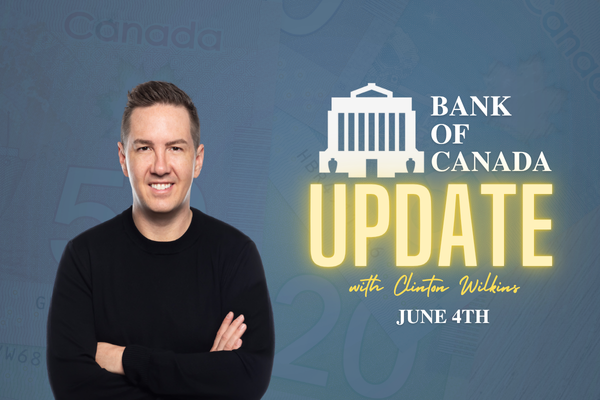Clinton Wilkins joins Todd Veinotte on 95.7 News Radio to discuss The Bank of Canada holding its key policy rate at 2.75%, marking the first pause after seven consecutive cuts.
Slow your mortgage rate roll
Given the recent coverage* (and occasional bouts of panic amongst consumers concerning the mortgage rate) on the Bank of Canada’s key rate increase, we’d like to take a moment to prescribe a healthy dose of slowing your roll.
This is a summer shower, not a hurricane
In our TeamClinton opinion**, locking in a variable mortgage rate this early in the game is more reactionary than wise (no offence). Traditionally, home owners tend to do better over the long run with a variable-rate mortgage. We advise staying the course for the time being, as well as keeping in touch with market trends (psst, follow our blog for current trends here).
No economics degree necessary
Deciphering the finance industry’s constant ebb and flow can be a) genuinely tricky, b) seemingly intimidating to the uninitiated, and c) occasionally time-consuming.
That’s why we recommend sparking a relationship with a mortgage broker (chemistry is important) you feel comfortable with and trust. With access to a variety of lenders, a mortgage broker provides more options than a Big Bank employee, who sells a few mortgage products for their financial institution.
As an intermediary between lender and borrower, mortgage brokers source the best rates and work with clients’ best interests instead of a financial institution’s bottom line. Did we mention they’re also adept at finding creative solutions to financial issues stemming from a variety of areas (debt consolidation, home improvements, separations…)?
Bonus Points: A great mortgage broker will become “your person.” They’re in your stable, and on your team. When the dirt hits the fan, they take a holistic view of your financial situation and work with existing equity to help you breathe easier again.
Understanding mortgage basics is a great way to develop healthy financial habits and encourages financial independence and empowerment.
Let’s start with a mortgage rate explanation
The Deal-io on variable vs fixed rates
As the name suggests, with a fixed rate, the mortgage rate and payment you’ll make remains the same for the entire period of the mortgage. In a variable rate mortgage, your mortgage rate will change with the prime lending rate as set by your lender. Quoted as prime +/- a specific amount, like prime -.88 per cent, prime lending rates might fluctuate but the relationship to prime stays constant over your term (you always have the -.88 per cent off prime).
Which is where the Bank of Canada comes in. The good folks at the Bank of Canada do not determine prime in any official capacity; Big Banks are free to set their rates wherever they like.
Traditionally, however, competition remains slim as all follow suit and adjust lending rates accordingly with the Bank of Canada’s adjustments. Interesting tidbit! Though Big Banks have always passed along rate increases to customers, they have not always adjusted their rate when the Bank of Canada has made decreases.
The Hot goss
TeamClinton’s final word:
Slow your roll. Take a deep breath. Brush up on your mortgage basics, if you like. Consider increasing mortgage payments before it becomes necessary and avoid the shock of future increases. Keep up with mortgage trends on our blog.
Don’t lock in rates yet; let’s see how things go. Variable-rate mortgages are historically less expensive over time (regardless of market fluctuations) and remain our recommended mortgage product for the majority of potential home owners.
Have more questions? Feel free to contact us!


